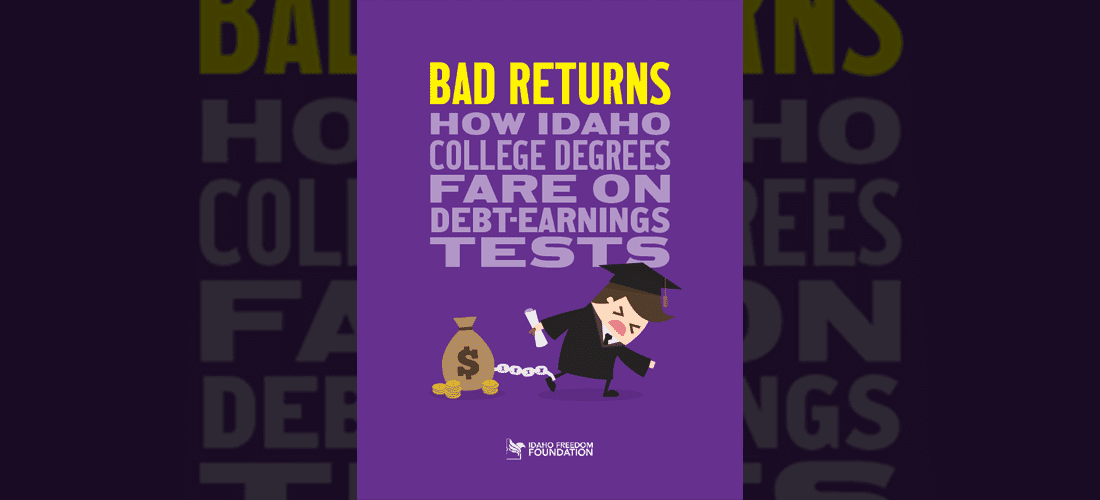


Students and parents no longer need to ask, “Is college worth it?” The latest report by the Idaho Freedom Foundation’s Center for American Education explains the financial prospects of studying in a particular field at Idaho’s colleges. Stakeholders deserve to know which programs are serving students well and which should be held accountable by policymakers and college administrators or trustees by either being improved or canceled.
Financial outcomes are not the only measures of program quality. Personal fulfillment can be a higher value for many students. Similarly, a program captured by Diversity, Equity and Inclusion (DEI) and no longer upholding the university’s core mission, to pursue truth, is another measure that should be considered. However, public universities are subsidized by the government and have a special burden to demonstrate whether taxpayers, parents and students' dollars are being spent wisely.
New data on graduate earnings and debt in Idaho from the U.S. Department of Education helps students, parents, college administrators, and policymakers distinguish between programs where student loan debt can be worthwhile and programs that are financially risky. This report uses a robust assessment measure by combining the Gainful Employment Equivalent (GEE), measuring annual earnings and discretionary income rates, and a Debt as a Percent of Earnings, median student loan debt as a percent of earnings two years after graduation, to evaluate college programs. The report assesses 163 of Idaho’s programs, which account for 80% of all bachelor’s degree holders and 53% of all associate degree holders.
As should be expected, this combined assessment measure reveals that performance varies greatly among academic fields. Among bachelor’s programs across the state's higher education system, several were assessed as “excellent,” including engineering disciplines, business-related disciplines, and health-related disciplines. The worst performing disciplines, two years after graduation are law, English literature, design and applied arts, history, anthropology, and sociology.
Several of these worst-performing fields tend to be disproportionately populated by left-wing faculty and captured by DEI, which does not contribute to student well-being on campus and may mean that graduates are perceived as out of step with Idaho’s prevailing cultural values. Additionally, data for some degrees from departments dominated by DEI is unavailable. This could be due to a small number of graduates in such programs or another data reporting issue. These degrees include English and gender studies at Boise State University and education, anthropology and English at University of Idaho.
Every associate degree program was scored as “excellent” with only two exceptions, both at Idaho State University (general liberal arts, scoring “Terrible”, and medical assisting services, scoring “Good”). Associate degree programs are so successful in providing a positive return on investment that there is no good reason to further subsidize community college tuition to make it cheaper or “free.”
Parents and students should beware of programs of highest concern at Idaho’s universities.
Additionally, policymakers should focus their accountability efforts on these worst-performing programs assessed as “poor” or “terrible.” Our report identified 19 programs which graduate approximately 675 students per year, many with high-risk or excessive debt. Six of these programs are at University of Idaho and include Intercultural/Multicultural and Diversity Studies, political science, international relations, parks and recreation, fine arts and law. However, as noted in the report, the nature of a discipline such as law may not be suited to assessment just two years after students graduate. Another eight of these programs are at Idaho State University and include English, social work, sociology, anthropology, liberal arts, history and geological sciences. The worst performing program in the state is the masters degree in student counseling and personnel services at Boise State University, where graduates have more than $57,000 in debt but are earning less than $35,000 annually two years after graduation.
Programs rated as mediocre that should be monitored and are increasingly pursuing DEI include sociology, anthropology, history and special education and teaching at Boise State University and sociology and history at the University of Idaho.
Overall, degree programs at Idaho’s public institutions aggregately rank 37th out of the 50 states in debt-earnings assessments among graduates, far below neighboring Utah, which ranked 1st, and far above neighbor Montana, which ranked 46th.
College administrators and trustees can use this report to better serve their students. Wise colleges will seek to expand successful programs and phase out or reform those that are financially dangerous for students or prioritize DEI rather than the cause of knowledge.
Similarly, policymakers can hold institutions of higher education accountable with this fine-grained tool. The report recommends exercising program-level accountability, which means that particular programs can be funded or defunded, deregulated, or monitored more closely on the basis of an objective, numerical standard.
The president of the State Board of Education has previously stated the need for “hard data” to objectively measure concerns around higher education. Student loan debt and post-graduation earnings are vital data needed to hold colleges accountable to taxpayers. The data presented in this report can be used to supplement other important measures considered by the legislature to assess programs including graduation rates, life satisfaction, and promotion of DEI. Idaho’s public officials have an excellent opportunity to expand programs that are succeeding and serving students well, especially in the health professions, while holding the worst performers accountable.
Download the report here: Bad Returns: How Idaho College Degrees Fare on Debt-Earnings Tests


